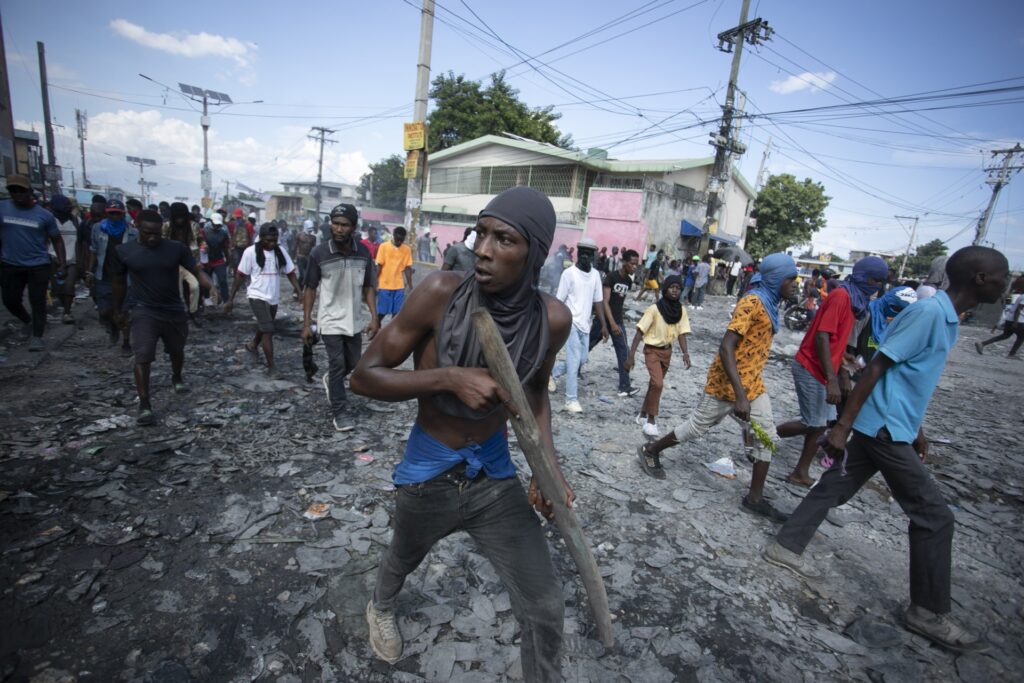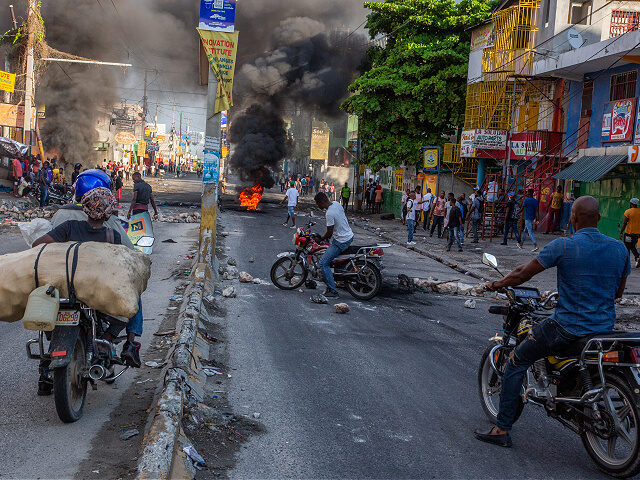U.N. Secretary-General Antonio Guterres on Sunday wrote a letter to the U.N. Security Council proposing the creation of an international “rapid action force” to help police in Haiti combat the gangs that have taken over critical infrastructure and blocked humanitarian aid.
“Guterres is not suggesting that the force be deployed by the United Nations. He said the 15-member Security Council should simply welcome such a force and notes that he may boost U.N. capacity to support a ceasefire or humanitarian arrangements and ensure coordination of efforts with an international force,” reported Reuters, which reviewed a copy of the letter.
Haiti has already asked the United States to assemble a “specialized armed force” to recapture control of the country’s main fuel port from gangs. Guterres’ letter left little doubt as to which country he expects to act as lead globo-cop in the non-U.N. military intervention he envisioned:
Guterres said a rapid action force “would, in particular, support the HNP (Haitian National Police) primarily in the Port-au-Prince metropolitan area in securing the free movement of water, fuel, food and medical supplies from main ports and airports to communities and health care facilities.”
“To this end, the force would support the HNP’s efforts to remove the threat posed by armed gangs and provide immediate protection to critical infrastructure and services,” he wrote.
Guterres said one country would need to lead the rapid action force and that the force “would be gradually phased out as the HNP regained state control of critical infrastructure targeted by gangs and began to restore general security and freedom of movement.”
Although Guterres said the “rapid action force” would be “gradually phased out,” he also suggested a “multi-national police task force” would take its place in the “medium term,” which means more-or-less permanently, given Haiti’s long track record of instability and gangsterism.
Guterres said the police task force would also be an “international” deployment, but not a United Nations deployment. Haiti was previously occupied by U.N. peacekeepers for 13 years beginning in 2004, followed by two years of a U.N. “police” deployment.
“A return to a more robust United Nations engagement in the form of peacekeeping remains a last resort if no decisive action is urgently taken by the international community in line with the outlined options and national law enforcement capacity proves unable to reverse the deteriorating security situation,” Guterres said in his letter to the Security Council.
The U.N. World Food Program (WFP) told the Security Council in late September that Haiti has become a humanitarian disaster because of the gangs, which stole a third of the WFP’s food stocks from warehouses that were “deliberately targeted, looted, and pillaged.”

A protester carries a piece of wood simulating a weapon during a protest demanding the resignation of Prime Minister Ariel Henry, in the Petion-Ville area of Port-au-Prince, Haiti, Oct. 3, 2022. (AP Photo/Odelyn Joseph, File)
The U.N. regarded the “state of siege” at Haiti’s Varreux fuel terminal as a matter of particular concern, since the gang blockades are preventing fuel from reaching hospitals and aid distribution centers.
Haiti also faces a cholera outbreak, with at least eight deaths reported so far. The U.N. blames gang violence for making the cholera crisis worse, as most of the cases documented so far have occurred in slums controlled by the gangs, so they have high levels of malnutrition and difficulty accessing medical care.
“Access to these areas has been very difficult since the end of July 2022 and the situation in Haiti has worsened over the past three weeks with blockades, fuel shortages, protest marches, looting and general strikes. These factors fuel the humanitarian crisis and hamper response efforts,” the World Health Organization (W.H.O.) warned last week.
“Insecurity and violence, coupled with severe shortages of fuel and drinking water, have forced many health facilities to reduce their activities and in some cases to stop them altogether. In addition to this, people who need treatment find it increasingly difficult to move around as public transportation is scarcely available due to a lack of fuel in the country,” added Doctors Without Borders (MSF), which said it has treated over 70 patients for cholera at its clinics in Haiti.
Some of the non-governmental organizations working in Haiti did not look favorably on the idea of bringing in foreign armed forces to stabilize the island, including Doctors Without Borders.
“Our immediate reaction, as a medical organization, is that this means more bullets, more injuries and more patients. We are afraid there will be a lot of bloodshed,” said Benoit Vasseur, MSF head of mission for Haiti, as quoted by the UK Guardian on Sunday.
The Guardian quoted the unnamed head of another aid organization who said foreign intervention might only increase instability and make the gangs stronger, because no matter how desperate their situation, many Haitians would take to the streets in protest.
“They come for years and things improve slightly but then they leave and it’s worse than when they came to begin with. Any sustainable solution to Haiti’s problems needs to come from within,” the NGO chief said.
Haitians are wary of foreign security forces, in part, because the long U.N. peacekeeping mission developed a bad reputation. U.N. peacekeepers were accused of sexually abusing very young Haitian women, some of whom were abandoned with children to raise when the U.N. forces withdrew. A panel appointed by the United Nations in 2011 also concluded the peacekeepers brought cholera to Haiti and caused the deadly epidemic in the 2010s by leaking contaminated sewage from their camp.
Louis-Henri Mars, director of a civil society group called Lakou Lape, recommended against deploying outside forces to Haiti until there have been elections and a change of administration because many Haitians view the current government as illegitimate.
“We have had foreign intervention in 1915, 1994, 2004 and yet here we are again today in the same situation. Every time there’s intervention the same system stays in place. We will be back to square one with illegitimate leaders that are there just to suck up the country’s money,” Mars warned.

COMMENTS
Please let us know if you're having issues with commenting.